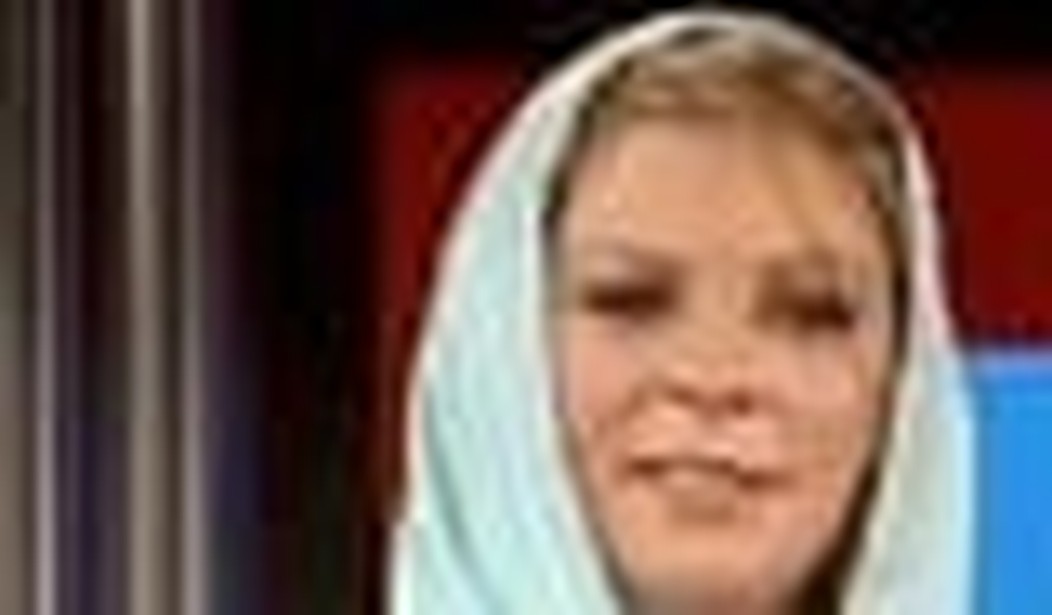Very recently Tony Blair’s sister-in-law, journalist Lauren Booth, embraced the faith after what she described as a “holy experience” in Iran. Based on what Ayaan Hirsi Ali has described as the brutal, totalistic character of Islam, one is obliged to ask why any modern career woman would opt for conversion to the Muslim religion.
After all, as so many autobiographies of Muslim women note, the religion bans anything that is fun (“haram,” or forbidden). No chewing of gum, no bicycle riding, no make-up, no eating in public, no painting of nails, no pets, no questions, and of course, no answering back. For many Muslim women, there is an eagerness to assert independence as soon as adulthood is reached.
How then does one explain Lauren Booth? She notes that in the city of Qom “I sat down and felt this shot of spiritual morphine, just absolute bliss and joy.” What precisely was Ms. Booth seeking, and why did she find it in Islam? Although it is difficult to generalize, I suspect that the convert is in a search for meaning in societies where the “anything goes,” permissive attitude of the moment proves to be a superficial void. Islam is totalistic; modernity, with all its freedom, is often vacuous.
One convert cited in the Daily Mail said Islam allows you to reject fads and fashion and “seek a higher goal.” Alas, one of course is free to reject fads without embracing Islam. But it is comforting — I guess — to have one’s life ordered by the ritual impulse of a totalistic religion. As another convert pointed out: “It makes life purer.” But does it?
By and large, Islam devolves into extremism, the repression of women, inequality, and brutality such as the stoning of adulterers. Converts, however, refer to the celebration of old-fashioned family values and hospitality, values which have been eroded in the West. For many, Islam is an escape route from the cultural degradation of Western society.
But what converts often confuse is culture and religion. The warmth a family confers is not the same as the demands of religious obedience.
Women in the West may deplore the pressure to act like men by drinking to excess and engaging in casual sex. But despite the pressure, one is free to make choices, a condition Islam rejects. However, it is precisely being the prisoner of action that appeals to many women. They don’t have to choose; the religion does it for them. It is the escape route from their vision of a broken society.
While it is easy to appreciate the search for meaning in societies that are culturally barren, the conversion to Islam is comparable to the move from anarchy to totalitarianism. In the 1920s and 1930s, Germany adopted the free and easy moral stance of the Weimar Republic. Life was “a bowl of cherries, don’t take it serious, it’s too mysterious.” The breakdown of moral order led to a period in which people sought stability in the form of Nazi dictatorship.
In a similar way, the moral dissolution of the West has many seeking an axis on which to rely — moral compass points. It may well be that the poles in this compass are static and harsh, but at least the limits of behavior are defined. Some poor souls unable “to find themselves” seek refuge in self-selected slavery. They are prisoners of their own vision. The West they see is morally bankrupt; Islam may be violent and harsh, but it does prescribe moral parameters.
Of course, the question that remains is why Christianity doesn’t provide the moral guidelines so many women are seeking. As I see it, Christianity’s unwillingness to assert the limits of behavior — a loss of confidence, if you will — has given Islam the upper hand with women who are suggestible and vulnerable to propaganda. Some might contend these converts have gone from the frying pan into the fire, but as they see it, Islam has offered meaning in lives without it and has provided strictures for lives that have only known license.









Join the conversation as a VIP Member